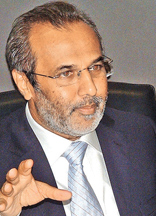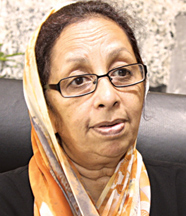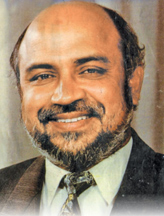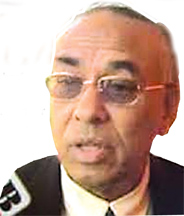Rendering the SLMC inconsequential
Muslims opt for mainstream parties signalling the end
to communal politics:
by Latheef Farook
The August 17 parliamentary polls sounded the death knell for the Sri
Lanka Muslim Congress (SLMC) and its splinter groups, as most of the
members entered Parliament through the United National Party (UNP)
Muslim votes. This happened due to the SLMC's wheeler dealer politics
driven by greed for perks and position, which saw the Muslim community
being taken for a ride for more than a quarter century.
|

Rauff Hakeem |
|

Ferial Ashraff |
|

Rishad Bathiudeen |
|

M. H. M. Ashraff |
|

Dr. Ameer Ali |
The SLMC as a single entity won only one seat, while its members
managed to enter Parliament through the UNP led United National Front (UNF)
for Good Governance, courtesy the agreement it entered into prior to the
election. The question that is being asked amongst the community is
whether the agreement was signed to really seek solutions to the burning
issues of the community or whether it was just another deal to ensure
positions and perks.
Commenting on the performance of the SLMC at the August 17 polls, Dr
Ameer Ali who hails from the East and now resides in Australia had this
to say in an article:
"If members of a political party surrenders that party's original
manifesto and symbol and embrace those of another party to win entry to
the legislature, and possibly to the Cabinet, what does it convey to
that party's dedicated supporters and to the supporters of the party
that now accommodated them? Aren't they a bunch of traitors to their own
party and birds of passage to the accommodating party? Who can trust
these instant-party-switchers or turncoats?
"These are questions that now arise regarding the position of the
SLMC and towards its future. With one or two exceptions almost all SLMC
candidates who won in this week's elections did so under the UNP symbol.
In doing so, did these contestants embrace only the UNP symbol and
not the manifesto of the UNP? If they had only embraced the symbol for
the sake winning the contest, then UNP should not accommodate any of
them in the new cabinet because they have no commitment to the UNP
manifesto. On the other hand, if these birds of passage had accepted the
manifesto of the UNP and its symbol, then they had treacherously
betrayed the trust placed on them by those Muslims who believed in the
SLMC as the only hope for the community's political survival.
"The time has come to take a serious stock of the current status,
costs and benefits of the SLMC."
Betrayed and exploited
Muslims have been betrayed by their own politicians and exploited by
all to suit their agendas. The selfish politics of the SLMC and its
splinter groups, that number more than half a dozen, have brought
nothing but disaster. As a result Muslim politicians have become
irrelevant. In fact this has been the more than quarter century history
of SLMC.
When the late SLMC founder M. H. M. Ashraff first mooted the idea of
a separate political party for the Muslims more than 25 years ago, the
community in general was against it as it was bound to strain Sinhala-Muslim
relations.
The party came into being in the aftermath of the Indo-Lanka Accord,
which paved the way for the merger of the Northern and Eastern Provinces
and the establishment of Provincial Councils. Several senior politicians
from the area said the Indian High Commission in Colombo handed over
cash donations to Tamil militants and the SLMC. The 1998 Provincial
Council election was fought on bitter and destructive communal lines,
and both Tamil militants and the SLMC were fully responsible for
dividing the two communities. Innocent people from the two communities
were made to pay for this later. Ashraff claimed that the "Holy Quran,
Shariah and Unity" were the slogan of his party. However, there was no
Islam or Shariah in the party, for since its inception it has been a
case of wheeler dealer politics hoodwinking the community.
For example, in the 1988 presidential election, the SLMC agreed to
support the Sri Lanka Freedom Party (SLFP), but at the eleventh hour
supported the UNP candidate, causing deep disappointment within the SLFP
circles. This earned the wrath of the SLFP towards the Muslim community.
Furious Muslims in Colombo and other areas blamed the SLMC for harming
their relations with the majority Sinhalese community. There was
speculation that Ashraff was bought over by late President Ranasinghe
Premadasa.
During the 1994 election, the SLMC tied up with the SLFP-led People's
Alliance [PA], under the leadership of then Prime Minister Chandrika
Kumaratunga. Around this time, the Muslims began losing faith in the
SLMC that built an image as a political party joining the winning side
to suit its leader's personal agenda.
In the 1994 election, the SLMC won seven seats and Prime Minister
Chandrika Kumaratunga formed the UPFA Government, with SLMC support,
providing the SLMC with an unprecedented bargaining power and influence
that was not to the liking of the majority community, especially the
hardliners.
Leadership crisis
Ashraf's sudden death triggered the inevitable leadership crisis
between Rauff Hakeem and Mrs. Ferial Ashraff, with the latter taking
over the leadership of the National Unity Alliance (NUA). According to
reports President Chandrika Kumaratunga exploited the power struggle in
the SLMC to her own advantage by making Mrs. Ferial a minister in her
government.
On the eve of joining the government, on January 28, 2007, SLMC
members negotiated as individuals and groups and got ministerial
portfolios. By now the Sinhala leadership had realized that SLMC
politicians could be bought over and manipulated to serve their
interests.
For example, according to speculation, former President Mahinda
Rajapaksa had used Rishad Bathiudeen to form a splinter group and
further divide the SLMC by offering a ministerial portfolio and other
incentives.
The community has been annoyed and exasperated with the SLMC and its
splinter groups for refusing to leave the government former President
Mahinda Rajapaksa, especially in the wake of the atrocities towards the
Muslims that culminated in the Aluthgama violence. Speculation was that
they were bribed to remain with the government.
The SLMC continued to remain with the Mahinda Rajapaksa government
and only at the eleventh hour began supporting Maithripla Sirisena
during the presidential polls in January 2015.
It is alleged that the party had struck a better deal before agreeing
to support the Sirisena camp. The consequence of this is the community's
utter disdain for the SLMC and its splinter groups.
On the campaign trail for the August 17 polls there were intense
nationwide discussions on burning national issues. However, the SLMC and
its splinter groups were seen as being in their own bubble, fighting
among themselves and humiliating each other, rather than airing Muslim
viewpoints in these discussions.
It is unfortunate that this very same discredited lot has got into
Parliament once again through the UNP, on the national list. Many
Muslims feel it would have been better if a UNP Muslim had been given
the chance in the national list, in view of the increasing Muslim votes
for the UNP all over the island, especially in the Kurunegala, Kalutara
and Puttlam electorates. The voting pattern indicates that the time has
come for mainstream Sinhalese political parties to deal with their
Muslim supporters and attend to the community's burning issues.
Pix: ANCL Library
|

